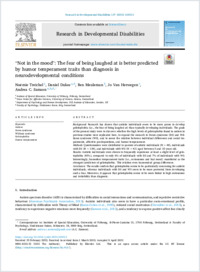“Not in the mood”: The fear of being laughed at is better predicted by humor temperament traits than diagnosis in neurodevelopmental conditions
IPC
- Treichel, Noémie Institute of Special Education, University of Fribourg, Fribourg, Switzerland
- Dukes, Daniel Institute of Special Education, University of Fribourg, Fribourg, Switzerland
- Meuleman, Ben Swiss Center for Affective Sciences, University of Geneva, Geneva, Switzerland
- Van Herwegen, Jo Department of Psychology and Human Development, UCL Institute of Education, London, UK
- Samson, Andrea C. Institute of Special Education, University of Fribourg, Fribourg, Switzerland
- 22.04.2023
Published in:
- Research in Developmental Disabilities. - Elsevier BV. - 2023, vol. 137, p. 104513
English
Background Research has shown that autistic individuals seem to be more prone to develop gelotophobia (i.e., the fear of being laughed at) than typically developing individuals. The goals of the present study were to discover whether the high levels of gelotophobia found in autism in previous studies were replicated here, to expand the research to Down syndrome (DS) and Williams syndrome (WS), and to assess the relation between individual differences and social impairments, affective predispositions, and humor temperament. Methods Questionnaires were distributed to parents of autistic individuals (N = 48), individuals with DS (N = 139), and individuals with WS (N = 43) aged between 5 and 25 years old. Results Autistic individuals were shown to frequently experience at least a slight level of gelotophobia (45%), compared to only 6% of individuals with DS and 7% of individuals with WS. Interestingly, humorless temperament traits (i.e., seriousness and bad mood) manifested as the strongest predictors of gelotophobia. This relation even transcended group differences. Conclusion The results confirm that gelotophobia seems to be particularly concerning for autistic individuals, whereas individuals with DS and WS seem to be more protected from developing such a fear. Moreover, it appears that gelotophobia seems to be more linked to high seriousness and irritability than diagnosis.
- Faculty
- Faculté des lettres et des sciences humaines
- Department
- Département de Pédagogie spécialisée
- Language
-
- English
- License
- CC BY
- Open access status
- green
- Identifiers
-
- DOI 10.1016/j.ridd.2023.104513
- ISSN 0891-4222
- Persistent URL
- https://folia.unifr.ch/unifr/documents/324778
Statistics
Document views: 65
File downloads:
- 1-s2.0-s0891422223000914-main_0.pdf: 141
